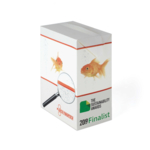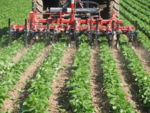Biobased resources
A major goal of the bioeconomy is to use larger quantities of biobased raw materials to produce energy, transport fuels and feedstock for industrial processes. This requires detailed analyses, simulations, concepts and processes. Major focus needs to be placed on issues relating to crop production, biomass potentials, land surface requirements, conversion technologies, biobased value creation networks and food security. Agriculture, forestry, waste management and the industry in general will need to work in concert as far as the raw materials all of them use or deal with are concerned.
-
Paper technology - 10/03/2021

Plastic is indispensable: it is cheap and practical and found in many disposable products such as drinking straws, disposable tableware or even packaging like bonded beverage cartons or bags – and it has a disastrous effect on the environment. The start-up company Plafco Fibertech Oy has developed a sustainable plastic substitute made of paper that could replace many disposable plastic products in the future.
-
From field to socket - 03/02/2021

Biogas plants that produce non-fossil fuels are very much in vogue at the moment. In the Swabian hamlet of Hahnennest, four family farms have joined forces to form an energy park and operate a local biogas plant, covering everything from substrate production to the sale of energy.
-
Paper production from plant fibres - 20/01/2021

Many consumers don't care about exactly how their paper packaging is made and what it is made of as long as it is "eco". But even producing recycled paper, trees need to be felled. An alternative could be paper made from cup plant. Together with partners, a company called Silphie Paper has developed concept for obtaining fibres for a new type of grass paper, while also producing heat, energy and nutrients for natural fertilisers.
-
Biobased building materials - 14/01/2021

Pliable and robust, light and stable - it sounds like an ideal material for the construction and many other industries. A team of researchers at the University of Stuttgart is researching what purposes the naturally good properties of chitin can serve.
-
Natural substance with herbicide potential - 10/12/2020

The sugar 7-deoxy-sedoheptulose (7dSh) is produced by cyanobacteria and inhibits the same metabolic pathway as the broad-spectrum herbicide glyphosate, thus making it an excellent herbicide candidate. Despite this amazing similarity, the microbiologist who discovered 7dSh, Prof. Dr. Karl Forchhammer, believes that this sugar has clear ecological advantages over glyphosate.
-
Outlook on the future of agriculture - 30/11/2020

The demand for organic products is continuing to grow; at the same time nature is being preserved – so why not switch completely to organic farming? The answer is simple: because not everyone can afford it, and with current consumption patterns not everyone would get enough to eat. A cooperative project is researching an an agricultural system that falls between conventional and organic farming.
-
Development of biogenic packaging - 16/11/2020

Modern packaging often boils down to a tick list of biogenic origin and/or biodegradability. But comprehensive sustainable packaging concepts need more than just that. Perishable foods, for example, require special barrier properties. The Albstadt-Sigmaringen University of Applied Sciences is researching packaging concepts for their sustainability.
-
Phosphorus recovery from sewage sludge - 21/10/2020

Biotechnology for the bioeconomy: in something known as the P-bac process, sulphur bacteria extract phosphorus from sewage sludge ash. Phosphorus is one of the key building blocks of life and an essential nutrient for plant growth. When there is not enough phosphorus in the soil, farmers apply it via organic or mineral fertilisers.
Website address: https://www.biooekonomie-bw.de/en/articles/biobased-resources







